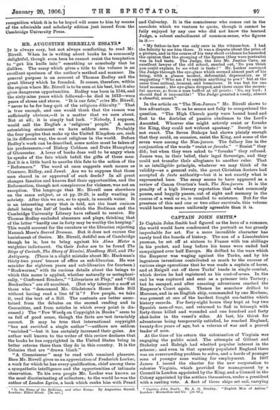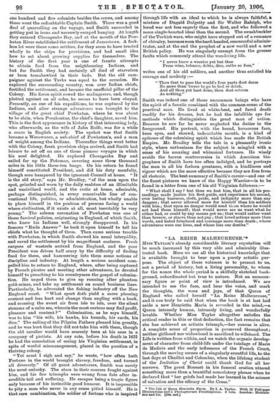CAPTAIN JOHN SMITH.* IF Captain John Smith had figured as
the hero of a romance, the world would have condemned the portrait as too grossly improbable for art. For a more incredible character has rarely trod the boards of history. The son of a Lincolnshire yeoman, he set off at sixteen to France with ten shillings in his pocket, and long before his teens were ended had campaigned over half Europe. He drifted to the wars which the Emperor was waging against the Turks, and by his ingenious inventions contributed so much to the success of various siege operations that he was made a captain of horse, and at Reigall cut off three Turks' heads in single combat, which device he had registered as his coat-of-arms. In the end he was captured and sent as a prisoner into Tartary ; but he escaped, and after amazing adventures reached the Emperor's Court again. Thence he somehow drifted to Morocco, and in an English ship, commanded by one Merhatu, was present at one of the hardest fought sea-battles which history records. For forty-eight hours they kept at bay two Spanish men-of-war, and returned to Safi in triumph with forty-three killed and wounded and one hundred and forty shot-holes in the vessel's sides. At last, his thirst for adventures being temporarily satisfied, lie reached England, twenty-five years of age, but a veteran of war and a proved leader of men.
At the time of his return the colonisation of Virginia was engaging the public mind. The attempts of Gilbert and Stukeley and Raleigh had whetted popular interest in the scheme ; and even in that sparsely populated England there was an overcrowding problem to solve, and a horde of younger sons of younger sons waiting for employment. In 1607 James I. issued the charter for the new corporation to colonise Virginia, which provided for management by a Council in London appointed by the King, and a Council in the Colony appointed by the settlers themselves, under a president with a casting vote. A fleet of three ships set sail, carrying
• Captain John Smith. By A. G. Bradley. "English Men of Action." London : MacruilLui and Co. 125. 6i1.:1
thielnindred and five colonists besides the crews, and aiiiting these went the redoubtable Captain Smith. There was a good deal of quarrelling on the Voyage, and Smith succeeded in getting put in irons and narrowly escaped hanging. At length they entered Chesapeake Bay, and at the mouth of the Pow- hatan River established the settlement of Jamestown. A feck- less lot were these same settlers, for they seem to have trusted wholly to the ships for provisions, and had small idea how to set about growing supplies for themselves. The history of the first year is one of frantic attempts to obtain food from the neighbouring Indians, and but for Smith they had certainly all died of starvation or been tomahawked in their beds. But the old cam- paigner against the Turks was equal to the occasion. He explored the surrounding country, won over Indian chiefs, fortified the settlement, and became the unofficial pillar of the Colony. His fierce spirit cowed the malingerers, and, though plotted against on all sides, he seems to have been obeyed. Presently, on one of his expeditions, he was captured by the Indians, and after strange adventures was brought to the village of the great chief Powhatan, where he was about to be slain, when Pocahontas, the chief's daughter, saved him. This is the first appearance in history of that interesting lady, who afterwards, as the wife of John Rolfe, was for a while a craze in English society. The upshot was that Smith became a Werowance, a sub-chief of Powhatan's, and a man of weight among the Indians. Thereafter things went better with the Colony, fresh provision ships arrived, and Smith had leisure to set off on one of those pioneer voyages in which his soul delighted. He explored Chesapeake Bay and sailed far up the Potomac, covering some three thousand miles in his little three-ton barge. On his return be found himself constituted President, and did his duty manfully, though sore hampered by the ignorant Council at home. "It is the old story," says Mr. Bradley, "of the man upon the spot, grizzled and worn by the daily realities of an illimitable and uncivilised world, and• the critic at home, admirable, perhaps distinguished, in every conceivable line of con- ventional life, politics, or administration, but wholly unable to place himself in the position of persons facing a world where civilisation, if it exists at all, must inevitably be very young." The solemn coronation of Powhatan was one of those farcical policies, originating in England, of which Smith, who knew his Indians well, stfongly disapproved. In his famous "Rude Answer" he took it upon himself to tell his chiefs what he thought of them. Then came serious trouble with Powhatan, in which Smith showed his usual intrepidity, and saved the settlement by his magnificent coolness. Fresh cargoes of wastrels arrived from England, and the poor President was driven half crazy by the difficulty of finding food for them, and hammering into them some notions of discipline and industry. At length a serious accident com- pelled him to return to England, where, after being captured by French pirates and meeting other adventures, he devoted himself to preaching to his countrymen the gospel of colonisa- tion. He urged them to give up running after phantom gold-mines, and take up settlement on sound business lines. Particularly, he advocated the fishing industry off the New England coast. "What sport doth yield a more pleasing content and less hurt and change than angling with a hook, and crossing the sweet air from isle to isle, over the silent streams of a calm sea, wherein the most curious may find profit, pleasure and content ?" Colonisation, as he says himself, was to him "his wife, his hawks, his hounds, his cards, his dice." The sailing of the Pilgrim Fathers pleased him greatly, and he was hurt that they did not take him with them, though the old cavalier would have scarcely been at his ease in a company of pietists. At any rate, before his death in 1631 he had the consolation of seeing his Virginian settlement, in spite of woeful mismanagement, placed in the position of a thriving colony.
"Yet must I sigh and say," he wrote, "how often bath Fortune in the world brought slavery, freedom, and turned all diversely." Of all great adventurers, Smith was surely the most unlucky. The stars in their courses fought against him, and his few triumphs were wrung from fate after in- credible toil and suffering. He escapes being a tragic figure only because of his invincible good humour. It is impossible to pity a man who never in any sense pitied himself. He is that rare combination, the soldier of fortune who is inspired
throughlife with an ideal to which be is alWays -faithful, a
mixture of Dtigald Dargetty and Sir Walter Raleigh, who loved war not 'less eagerly than the first, and who followed a more single-hearted ideal than the second. The-swashbuckler of the Turkish wars, who might have stepped out of a romance of chivalry, becomes soon the hard-handed, resourceful adminis- trator, and at the end the prophet of a new world and a new British policy. He was singularly exempt from the grosser faults which commonly attend the wandering life.
"I never knew a warrior yet but thee
From wine, tobacco, debts, dice, oaths so free,"
writes one of his old soldiers, and another thus extolled hie courage and modesty :— "Thou that to pass the world's four parts dost deem No more than 'twere to go to bed or drink,
And all thou yet hest done, thou dost esteem As nothing."
Smith was indeed one of those uncommon beings who have the spirit of a fanatic combined with the common-sense of the practical man. He lived at white-heat, and fazed death readily for his dreams, but be had the infallible eye for methods which distinguishes the great man of action.
Because he saw far he never neglected the duties in the foreground. His portrait, with the broad, humorous face, keen eyes, and shrewd, indomitable mouth, is a kind of epitome of the colonising spirit which has made the British Empire. Mr. Bradley tells the tale in a pleasantly ironic style, where enthusiasm for the subject is mingled with a sense of his amazing and whimsical fortunes. He wisely avoids the barren controversies in which American bio- graphers of Smith have too often indulged, and he portrays the man in all his forlorn greatness, with a kindliness and vigour which are the more effective because they are free from all rhetoric. The best summary of Smith's career—and one of the finest pictures we know of the Happy Warrior—is to be found in a letter from one of his old Virginian followers :—
"What shall I say ? but thus we lost him, that in all his pro- ceedings made justice his first guide, and experience his second, ever hating baseness, sloth, pride, and indignity more than any dangers; that never allowed more for himself than his soldiers with him ; that upon no danger would send them where he would not lead them himself ; that would never see us want what he either had, or could by any means get us ; that would rather want than borrow, or starve than not pay ; that loved actions more than words, and hated falsehood and cozenage more than death; whose adventures were our lives, and whose loss our deaths."



































 Previous page
Previous page